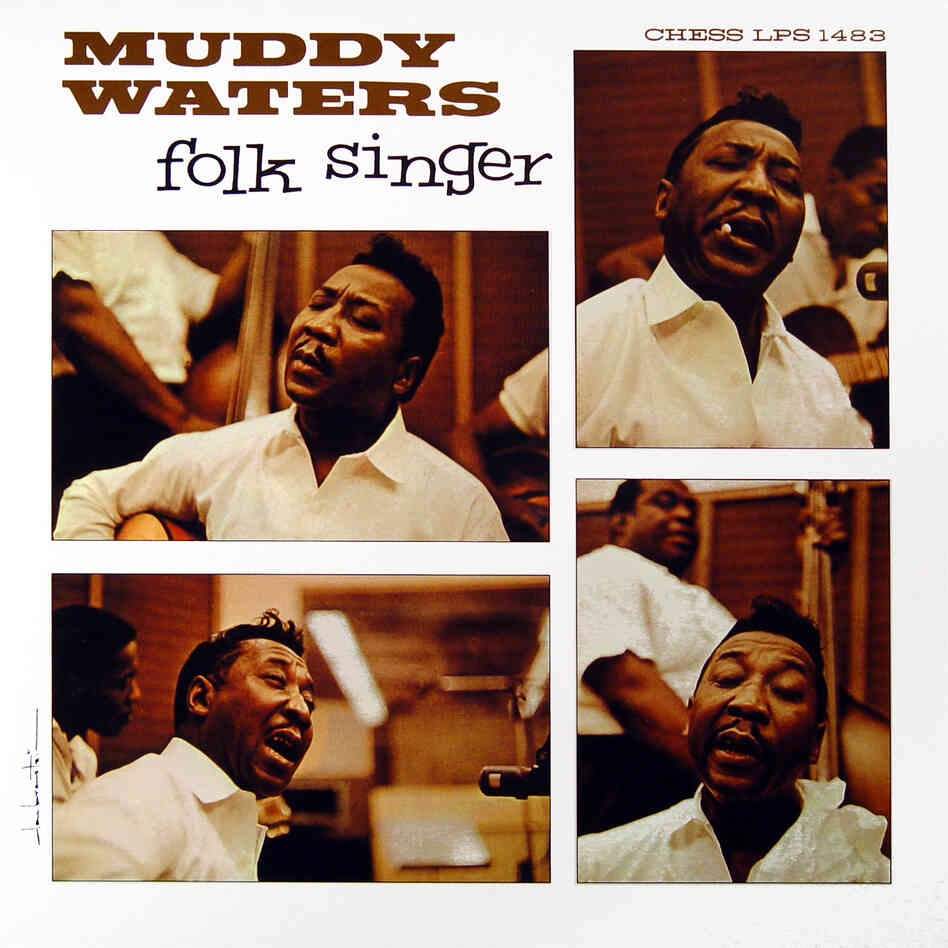Tuesday, January 28, 2014
folk singer
Muddy Waters unplugged his guitar for this raw and righteous down home acoustic blues packaged to appeal to fans of folk. McKinley Morganfield was born in rural Mississippi and his nickname of Muddy was given by his grandmother because he liked to play in the waters of nearby Deer Creek. Waters would reveal: ''When I was around three years old I was beatin' on bucket tops and tin cans. Anything with a sound I would try to play it; I'd even take my stick and beat on the ground tryin' to get a new sound. And whatever I beat on, I'd be hummin' my little baby song along with it. My first instrument, which a lady give me and some kids soon broke for me, was an old squeeze-box, an accordion. The next thing I had in my hand was a jew's-harp. When I was about seven I started playing the harmonica, and when I got about thirteen I was playing it very good. I should never have give it up! But when I was seventeen I switched to the guitar and put the harp down. I sold our last horse for the first guitar I had. Made fifteen dollars for him, gave my grandmother $7.50, I kept $7.50 and paid about $2.50 for my guitar.''
He began emulating the slide guitar styles of Son House and Robert Johnson and was recorded by Alan Lomax for the Library of Congress. Waters eventually relocated to Chicago where he started playing an electric guitar so he could be heard over the crowds in the blues clubs. He started making recordings for Leonard and Phil Chess' Aristocrat Records, which later became Chess Records. His first success came with the single "I Can't Be Satisfied" and "I Feel Like Going Home". He recorded several classics over the next few years including 'Rollin Stone', 'I Just Want to Make Love to You', 'Hoochie Coochie Man', and 'Mannish Boy'.
In 1958, he took his electric blues act to England and blew audiences away. Two years later, his performance at the Newport Jazz Festival was released as an album and brought his music to a whole new audience. In was in the wake of this acclaim that Waters was enticed by the Chess brothers to record an acoustic album to appeal to the burgeoning folk movement. 'Folk Singer' was produced by Willie Dixon and Ralph Bass at Tel Mar Recording Studios in Chicago, Illinois with composer Muddy Waters on guitar and vocals; Buddy Guy, Sammy Lawhorn, and James Madison on guitar; Otis Spann on harmonica and piano; Francis Clay, Clifton James, and S.P. Leary on drums; Willie Dixon and Milton Rector on bass; and J.T. Brown on clarinet and tenor saxophone.
Waters would express: "There's no way in the world I can feel the same blues the way I used to. When I play in Chicago, I'm playing up-to-date, not the blues I was born with. People should hear the pure blues - the blues we used to have when we had no money."
http://www.muddywaters.com/
"My Home Is in the Delta"
"Long Distance"
"My Captain"
"Good Morning Little Schoolgirl"
"You Gonna Need My Help"
"Cold Weather Blues"
"Big Leg Woman"
"Country Boy"
"Feel Like Going Home"
bonus tracks:
"The Same Thing"
"You Can't Lose What You Never Had"
"My John the Conqueror Root"
"Short Dress Woman" (John T. Brown) – 2:49
http://www.youtube.com/watch?v=NYjhHX9w83Q
"Put Me in Your Lay Away" (L.J. Welch) – 2:56
http://www.youtube.com/watch?v=iZFHBH1XLPU
Folk Singer
full album:
"My Home Is in the Delta" (Waters) – 3:58
"Long Distance" (Waters) – 3:30
"My Captain" (Willie Dixon) – 5:10
"Good Morning Little Schoolgirl" (Sonny Boy Williamson) – 3:12
"You Gonna Need My Help" (Waters) – 3:09
"Cold Weather Blues" (Waters) – 4:40
"Big Leg Woman" (John Temple) – 3:25
"Country Boy" (Waters) – 3:26
"Feel Like Going Home" (Waters) – 3:52
bonus tracks[edit]
"The Same Thing" (Dixon) – 2:57
"You Can't Lose What You Never Had" (Waters) – 2:46
"My John the Conqueror Root" (Dixon) – 2:22
"Short Dress Woman" (John T. Brown) – 2:49
"Put Me in Your Lay Away" (L.J. Welch) – 2:56

No comments:
Post a Comment